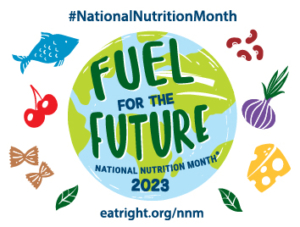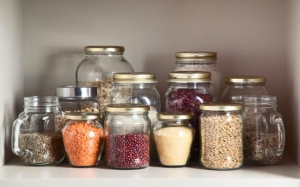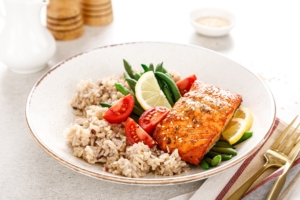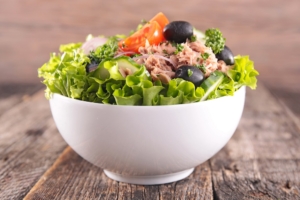By Roberta Catuogno
If you’ve ever taken a yoga class with me, you likely have heard me say “find a place that you can sustain.” When I say that, I mean that wherever you are, you need to be able to breathe for a long time. So don’t get yourself into a twisty pretzel pose and try to balance on your pinky toe. It’s not sustainable – at the very least, keep your whole foot flat on the floor so you can stay in that pretzel pose for a longer time to receive the benefits of the posture. But what does that have to do with nutrition? I’m so glad you asked!
 The theme for this year’s 2023 Nutrition Month is “Fuel for the Future,” which is directly related to sustainability. There is a great deal of attention being paid to making our world a better place for future generations. Yes, it is a huge global issue, and also yes, we can do things on an individual basis that will benefit the planet and benefit our health.
The theme for this year’s 2023 Nutrition Month is “Fuel for the Future,” which is directly related to sustainability. There is a great deal of attention being paid to making our world a better place for future generations. Yes, it is a huge global issue, and also yes, we can do things on an individual basis that will benefit the planet and benefit our health.
Sustainable nutrition starts by incorporating a flexible dietary pattern that largely consists of vegetables, fruits, whole grains, legumes, nuts, and unsaturated oils; includes a low to moderate amount of seafood and poultry; and includes no or a low quantity of red meat, processed meat, added sugar, refined grains, and starchy vegetables.
Sustainable nutrition forces you to make better food choices, making you healthier in the process. If you incorporate meal planning into your routine, make a shopping list, and buy only what you need, you will reduce food waste and trim your grocery bill. One final suggestion would be to choose sustainable-minded companies when making purchases. It will benefit our community as well as our environment.
To get you started on a more sustainable journey, here some smart tips for successful meals from the Academy of Nutrition and Dietetics:
 Keep a Well-Stocked Pantry: If you don’t have time to plan meals some days or have unexpected guests, a well-stocked pantry can relieve some of the pressure when it comes time to make a meal. Keep the following on hand for quick, easy-to-fix dishes.
Keep a Well-Stocked Pantry: If you don’t have time to plan meals some days or have unexpected guests, a well-stocked pantry can relieve some of the pressure when it comes time to make a meal. Keep the following on hand for quick, easy-to-fix dishes.
- Shelf Stable Products
- Dried or canned beans, peas and lentils (such as black, garbanzo, kidney, white and pinto beans; green, yellow or split peas and lentils)
- Canned vegetables with no added salt (such as diced tomatoes, peas, green beans and corn)
- Whole grains (such as brown rice, quinoa, oats, millet and whole-grain pasta)
- Pouches or canned fish and chicken
- Olive, canola or other vegetable oils
- Dried herbs and spices
- Frozen Foods
- Vegetables (such as broccoli, cauliflower, carrots and brussels sprouts)
- Fruit (such as berries, cherries and bananas)
- Whole wheat pizza dough
- Frozen poultry or seafood
- Shelf Stable Products
 Don’t Stress: You don’t need to be a master chef in order to whip up something tasty and nutritious. You can create healthy and tasty meals without a recipe. For example:
Don’t Stress: You don’t need to be a master chef in order to whip up something tasty and nutritious. You can create healthy and tasty meals without a recipe. For example:
- Baked fish with sautéed veggies and rice
- Black bean and vegetable burrito
- Scrambled eggs with cheese, salsa and whole grain toast
If you don’t have an ingredient, try substituting with something similar:
-
- Making black bean burgers but running short on black beans? Try them with pinto beans instead.
- Having pasta but forgot the sauce? Toss together canned tomatoes, a drizzle of olive oil and season with herbs to provide that extra flavor.
- If you’re missing sour cream, plain Greek yogurt can be used in its place in chili, on potatoes and in baked goods.
- Cauliflower can replace broccoli in casseroles and soups.
 Mix and Match: These easy combinations pair well and contain many items you may already have on hand:
Mix and Match: These easy combinations pair well and contain many items you may already have on hand:
- Whole grain pasta with garbanzo beans and canned tomatoes, seasoned with basil and served with a medley of microwaved frozen vegetables on the side.
- Quinoa with black beans, corn, and bell pepper, dressed with olive oil and lime juice.
- Salad with lettuce, hard boiled eggs, tuna, tomatoes and olives and dressed with a little olive oil and vinegar.
- Soup using grilled or baked chicken.
- Low-sodium broth, veggies and brown rice.
We hope these tips help you during National Nutrition Month and beyond. Please feel free to reach out and let us know how you are making your diet more sustainable.
Roberta Catuogno is the Healthy Living Director at the Fanwood-Scotch Plains YMCA. She can be reached at rcatuogno@fspymca.org.

